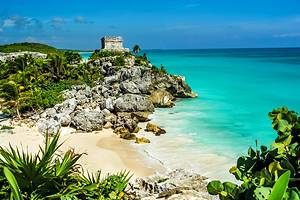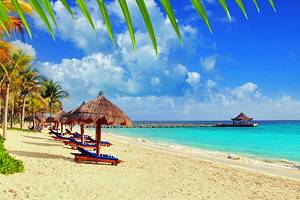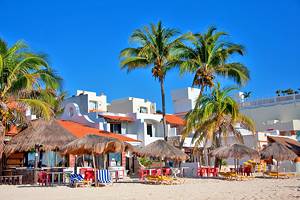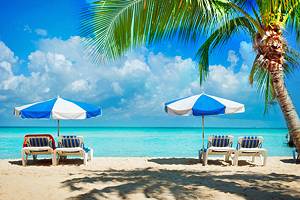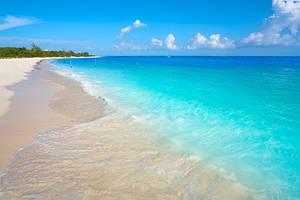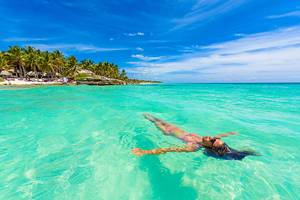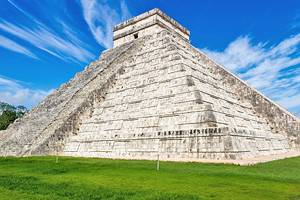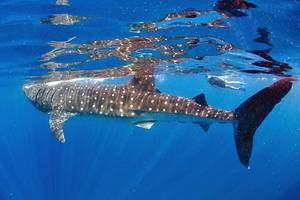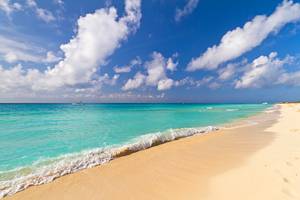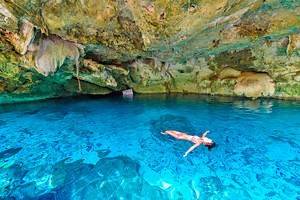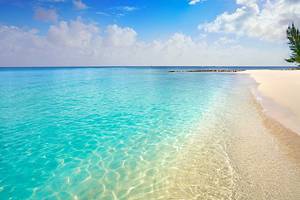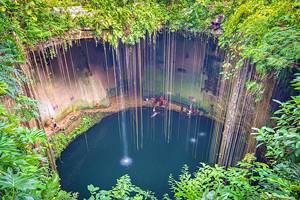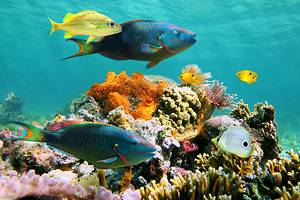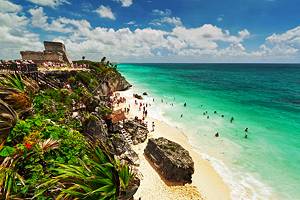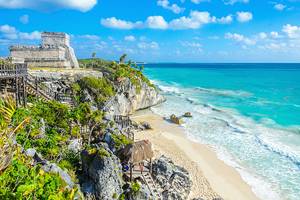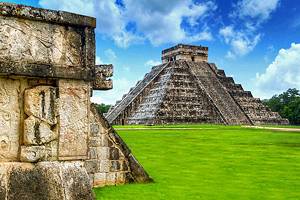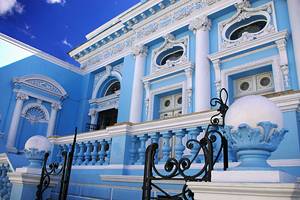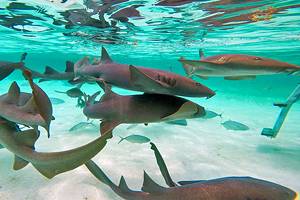Day Trips from Cancún
Believe it or not, there is more to Cancun and Playa del Carmen than the beach. If you can bear to tear yourself away from said beautiful beaches, the bustling streets humming with vendors, and the gorgeous hotel pools, you will undoubtedly be rewarded with some of the best sightseeing and day trip experiences in Mexico.
Among the many wonderful tourist attractions and places to visit within an easy commute by car or bus from the Mayan Riviera are a number of fine Mayan ruins, including Chichén Itzá, one of the largest sites in Mexico. Also worth visiting are the Yucatán's many fascinating cenotes - ancient underground rivers and sinkholes - which can now be enjoyed for swimming and snorkeling.
The Cancun area is also an easy spot to grab a taxi, though you will pay considerably more to take a taxi. Uber does exist in Cancun, but because of clashes between Uber and the local taxi companies, it is safest to go with an authorized taxi. You can also rent a car and drive yourself, as the road system is well-maintained and safe for tourists.
Plan your sightseeing itinerary with our list of the top day trips from Cancún, Playa del Carmen, and the Mayan Riviera.
The Mayan Capital: Chichén Itzá

Three hours west of the Mayan Riviera, Chichén Itzá is one of Mexico's largest and best-restored archaeological points of interest. Highlights of a visit to this UNESCO World Heritage Site include numerous fine examples of the region's famous Chacmools, reclining figures holding sacrificial vessels, which were created to guard the site's many temples.
The most important buildings here are the 30-meter-tall El Castillo, also known as the Pyramid of Kukulkán, and the magnificent Temple of the Warriors with its many columned halls. Also of interest is the Tzompantli - The Wall of Skulls - a large square platform that served as a base for the stakes on which the decapitated heads of human sacrifices were impaled.
Tour: A great way to enjoy this unique location is to take organized tour which is offered by several local tour operators. Some tours enable early access to the site, which allows you to avoid both the crowds and the heat, and an experienced archaeologist will take you to areas not usually available to the general public.
Keep in mind that it takes roughly six hours round-trip to drive to and from Chichen Itza to Cancun. I would suggest taking a tour over driving yourself to Chichen Itza if you're only doing it as a day trip. It takes all of the guesswork out, plus you have a guide to give you context on what you are looking at.
Bus: ADO will also take you to Chichen Itza from Cancun. It departs in the mornings from downtown Cancun and returns in the afternoons. However, if you're taking the bus it means that you have five hours at the ruins to wander around, and there is not much else to do.
If five hours at the archaeological site seems like way too much time, I would suggest taking the bus from Cancun to Valladolid instead, as Valladolid is a very interesting little town with many restaurants and attractions. From Valladolid, you can take a shared van (colectivo) to Chichen Itza. The ride from Valladolid to Chichen Itza is about 45 minutes.
The Fortified City of Tulum
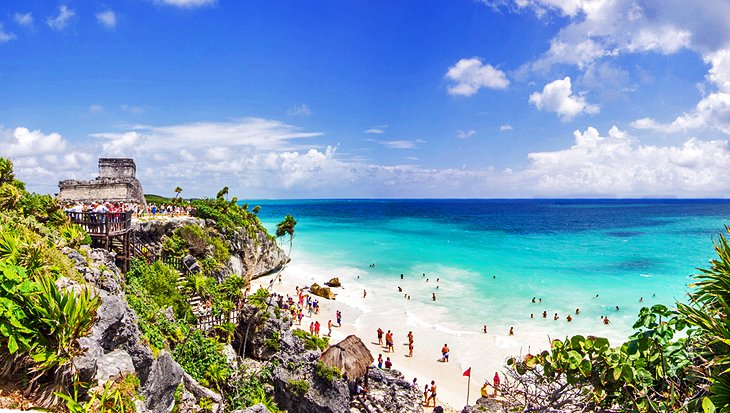
Another of the Yucatán Peninsula's most important Mayan sites is Tulum. Perched overlooking the ocean and a pristine white-sand beach, Tulum is the only major fortified Mayan coastal town, and is unique in that it is one of the few such sites to have been built with defensive walls surrounding it.
Extending some 380 meters north to south and 165 meters east to west, these ancient fortifications were built to a height of up to five meters in places, with many of the original entry points still intact.
Another important structure is the Temple of the Frescos, notable for its stucco reliefs depicting seated figures with elaborate headdresses, as well as large bas-relief masks that were once painted over.
The largest building is the Castillo, perched on the cliff-edge overlooking the sea and of interest for its broad steps leading to a terrace on which the two-roomed temple stands, along with a stone used for human sacrifices.
Tour: Tulum is also well served by formal tours, with departures available from both Cancún and Playa del Carmen.
Bus: It's possible to take the bus to Tulum from Cancun, but requires a few more steps. The bus trip from Cancun will drop travelers off at the bus station in Tulum town. The drive is roughly two hours. From Tulum town, it is about a 10-minute bike ride or a four-minute taxi ride to the ruins. If you are not doing a tour, my suggestion would be to spend the entire day in Tulum after visiting the ruins and visit its beautiful beaches, restaurants, and funky shops.
- Read More: Things to See & Do at the Tulum Ruins
Swimming in Yucatán's Crystal Clear Cenotes
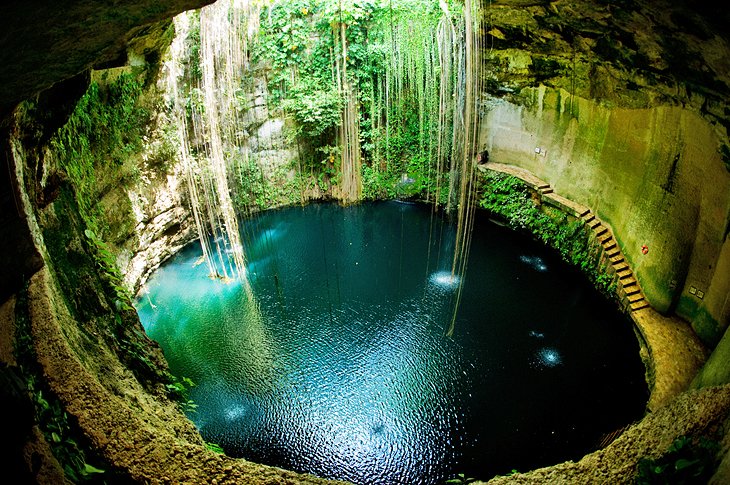
A highlight of any visit to the Yucatán Peninsula is plunging into one of the state's famous cenotes, a form of natural swimming hole unique to the region's porous limestone bedrock. Most often consisting of fresh water, these water holes were much revered by the Mayans as a source of drinking water in times of drought. They also held religious significance, including as burial sites or for human sacrifices.
These days, these pristine pools - whether cave cenotes or the open-air variety - are largely free to explore and, thanks to their high mineral content and purity, make for a thrilling swimming and snorkeling experience (some are even deep enough for diving).
A couple of the best within driving distance of Cancún and Playa del Carmen include Aktun Chen, part of a larger attraction that includes ziplining and other activities, and Ik Kil, a well-known cenote outside Pisté and part of the Ik Kil Archeological Park. Cancun to Aktun Chen is about an hour and a half drive. The drive from Cancun to Ik Kil is two and a half hours and can be combined with a visit to Chichen Itza.
Across the Water: Cozumel
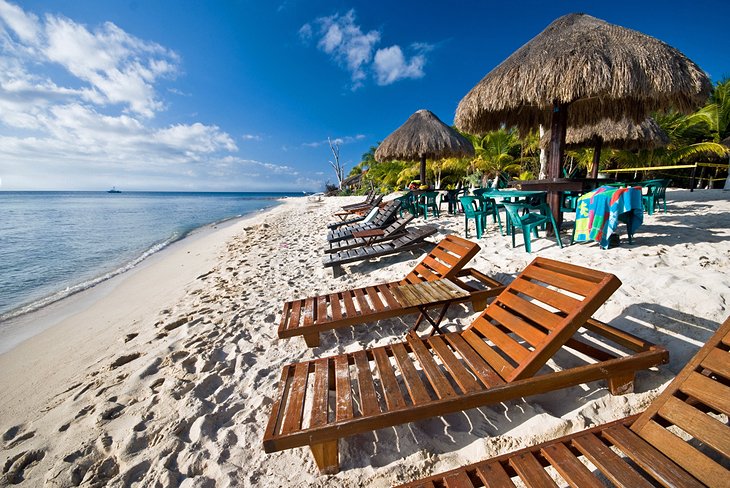
One of Mexico's largest islands - it's 45 kilometers long and 18 kilometers wide - Cozumel makes for a great day trip for those staying at a resort on the mainland. Traveling to this beautiful island located about 20 kilometers off the northeast coast of the Yucatán peninsula is half the fun, whether you choose to take the regular hydrofoil services from Playa del Carmen (which lies directly opposite the island) or Cancún, or a more leisurely tour boat.
In addition to its many superb beaches, Cozumel has much to offer day-trippers the moment they arrive in the capital of San Miguel. Just a short walk from the ferry terminal is the Museo de la Isla with its exhibits dealing with the island's geography and history, as well as a number of great shopping options offering everything from local crafts to luxury goods.
For those willing to venture a little further afield, Chankanaab National Park (Little Sea) is a natural freshwater lake and adventure park offering activities such as ziplining, treetop climbing, and swimming with dolphin experiences. For those looking for a little Mayan culture, Cozumel boasts some 30 sites, the best being San Gervasio with its large temple built in 800 CE.
The best option to get to Cozumel from Cancun is the bus-to-ferry transfer with ADO to Playa del Carmen. Take the bus from the station in downtown Cancun down to Playa del Carmen's 5th Avenue bus station — there are two bus terminals in Playa del Carmen so it's important to check. The 5th Avenue terminal is just a few minutes walk from the ferry pier, where you can catch direct service to Cozumel aboard Ultramar and WinJet. The trip is about half an hour one-way.
- Read More: Tourist Attractions in Cozumel
Xel-Ha Park
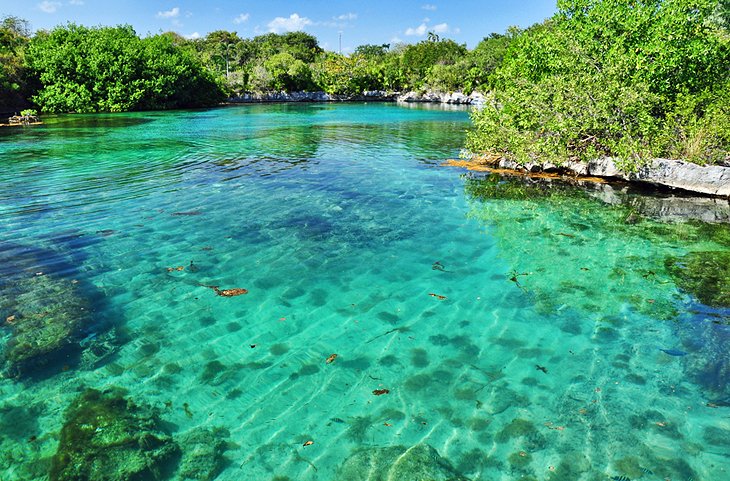
Just a short distance south of Playa del Carmen is Xel-Ha Park (Parque Xel-Há), a fun aquatic center named after the adjacent Xel-Ha Mayan site. More an ecotourism adventure than a theme park, the central feature of this award-winning attraction is a natural inlet and lagoon serving as a huge aquarium that is home to countless species of tropical fish (part of the park is also set aside as a reserve for endangered sea turtles).
A highlight of a visit is the chance to swim and snorkel in its pristine waters as you marvel at the fish and underwater caves.
If you drive yourself to Xel-Ha, the drive is about an hour and 20 minutes from Cancun. Taxis will also take you Xel-Ha from Cancun, but this will be a very expensive option. Organized tours are also available.
There are departures from the Cancun bus station that will drop you off on the side of Highway 305, about a 10-minute walk from the entrance to Xel-Ha. I suggest either taking a tour or driving yourself.
Climb the Ancient Pyramid at Cobá
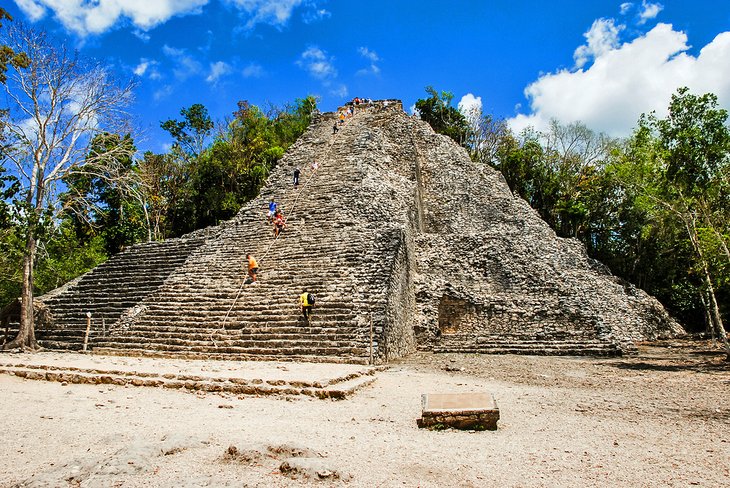
Another of the Yucatán peninsula's large Mayan sites, Cobá's ruins lie deep in dense bush country halfway between the Mayan Riviera and the Yucatan state capital, Mérida. Built between AD 600 and 900, this 70-square-kilometer site was still occupied when the Spanish arrived in the 16th century (it was abandoned shortly after).
Highlights include a number of excavated pyramids and temples among the 6,000 buildings and other structures known to occupy the site, as well as the numerous "sacbeob" (causeways surfaced with limestone mortar and flattened by heavy rolling to form roads), which link the center with the outlying districts.
Unlike many similar Mayan structures, Cobá's Ancient Pyramid can still be climbed, so wear appropriate footwear!
If you do want to see Coba on your own, I recommend that you drive yourself to Coba from Cancun. The drive is about an hour and 45 minutes. The bus is also an option, but it's a lot more complicated. You will have to take the ADO bus from Cancun to Tulum and take a shared van or a taxi to the Coba ruins. Local tour operators also offer organized tours.
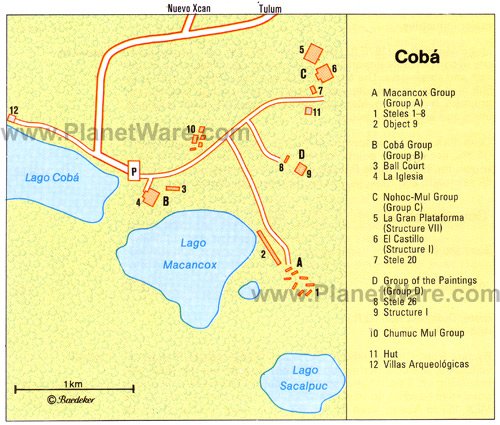
The Caves of Balankanché
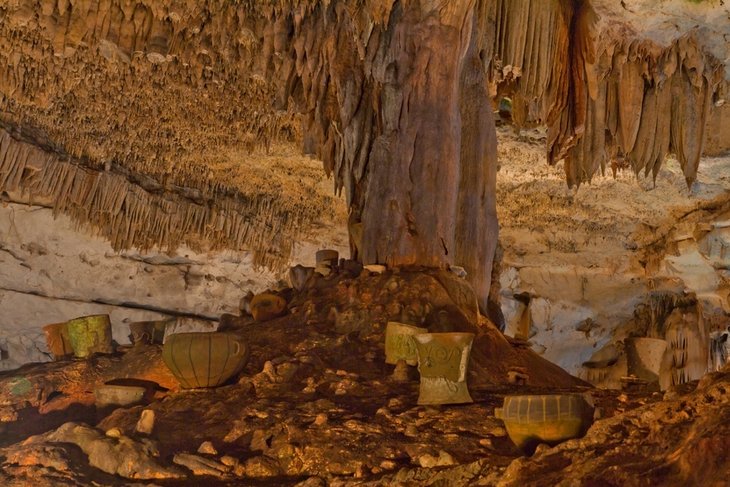
Just a 15-minute drive west of Chichén Itzá, Balankanché is an easy day trip that's well worth doing. Known as the Throne of the Jaguar Priest, the ruins consist of a fascinating burial site in a limestone cave that was only discovered in 1959.
Part of an extensive labyrinth of underground caverns and waterways still to be investigated, the section currently open is lit up to display the numerous clay dishes, jars, and other objects lying exactly where priests left them centuries ago. Many items are decorated with the mask of the Toltec-Aztec Rain god Tláloc, suggesting that the cave was an exclusively Toltec burial place.
The focal point of the cave is a chamber containing an altar and a formation of stalactites reminiscent of the sacred Mayan ceiba tree. A narrow passageway leads to an even deeper chamber, at the end of which, crystal-clear water surrounds another altar also dedicated to the Rain god Tláloc (look out for the tiny shrimps and blind fish that live in the pool).
Because it's not a tremendously well-known site, there are not many organized tours that will take you there. Instead, it's best to rent a car to drive yourself or to take a taxi from Valladolid or Chichen Itza. The drive from Cancun is about two and a half hours. It's roughly 40 minutes from Valladolid.
Colonial Mérida
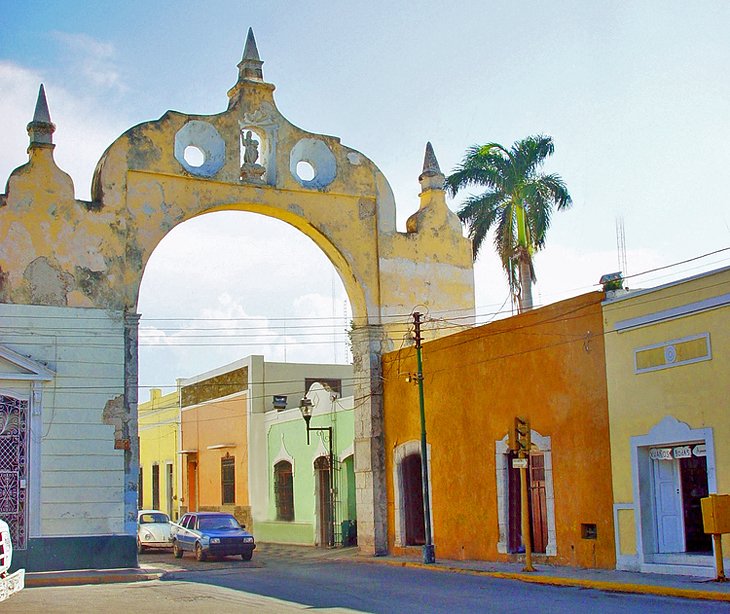
For those seeking a dose of colonial Mexico, Mérida, the state capital, is a delightful addition to a Mexico itinerary. Best appreciated over a two- or three-day excursion, Merida's old-world charm stands in stark contrast to the ultra-modern resort areas of the Mayan Riviera some three hours away.
Also known as "ciudad blanca" - the "white city" - due to the locals' preference to dress in traditional white clothing, Mérida was settled by the Spanish in 1542, and thanks to its many fine parks and gardens, remains a wonderful place to explore on foot. Now home to countless expatriates from Europe, the US, and Canada, many of the city's quaint old squares, such as Plaza Mayor (Plaza de la Independencia), are surrounded by art galleries and fine boutique stores, as well as great restaurants and cafés.
A number of notable buildings can also be found in the picturesque Parque Cepeda Peraza, including the Church of Jesús with its exquisite altarpiece of carved and gilded wood. Another great way to see the old city center is to take a horse-drawn "calesas" ride.
While visiting Merida, you can also take a side trip to visit the archaeological ruins of Uxmal. Uxmal is another ancient Maya city that is known for its striking pyramids, temples, and other structures. It's one of the lesser-visited archaeological sites in the Yucatan peninsula, which means that unlike Tulum and Chichen Itza, you may feel like you have this spot all to yourself.
Despite being less trafficked, Uxmal remains one of the most important historical cities in the Mayan world, just like Calakmul, Chichen Itza, Palenque, and Tulum.
Travelers should note that Merida is about a three-and-a-half-hour drive from Cancun, so you won't find many day tour options from Cancun itself. If you want to see Merida, I recommend renting a car and driving or taking the ADO bus. The bus trip is about five hours, so I suggest considering spending the night, as well. Merida has so many great things to do that it will be worth the extra time.
- Read More: Tourist Attractions in Mérida
Fuerte de San Miguel
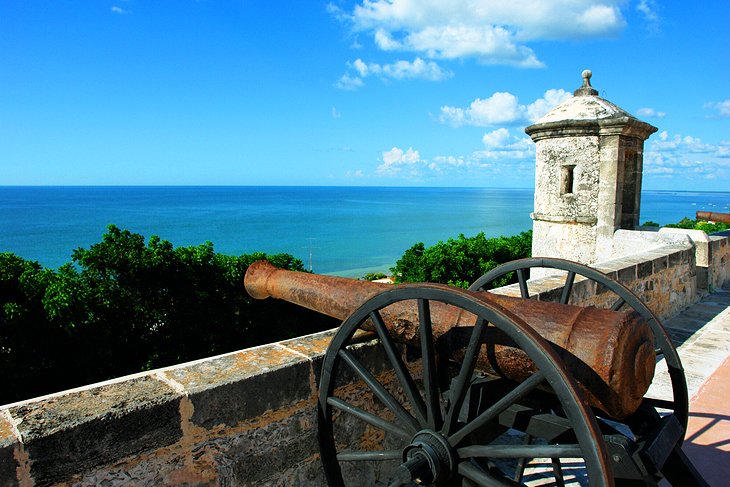
Although far enough from Cancún and Playa del Carmen to warrant an overnight stay, the coastline to the north of Mérida is certainly worth visiting. A particularly charming spot is the small seaside town of Campeche, famous for its old Spanish fort, Fuerte de San Miguel.
Set in a picturesque location overlooking the town, this piece of old Europe is accessed over a drawbridge and still has the original cannons installed by the Spanish. Apart from its great views, other highlights include a small but very interesting archaeological museum (Museo de Arqueología) with numerous artifacts from a wide range of Mayan cultures, including a set of terra-cotta figurines from Jaína.
Campeche itself is worth exploring and offers a variety of accommodation options.
The bus trip from Cancun to Campeche with ADO is almost eight hours, so I suggest renting a car, which cuts drive time down to five hours.
Recently a train service, Tren Maya has become available on this route. This just began operating in December of 2023 and some of the kinks are still being worked out.
Valladolid and the Church of San Bernardino
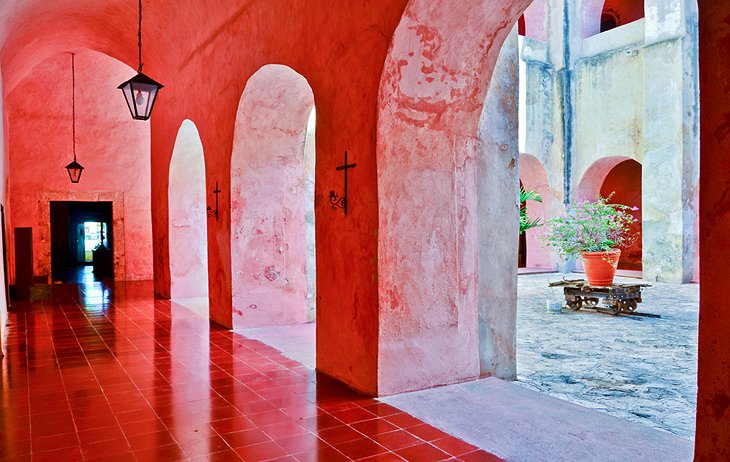
A little farther east of Mérida and Chichén Itzá is the lovely colonial town of Valladolid. Its splendid old architecture and laid-back pace make it a fun overnight excursion from Cancún and Playa del Carmen.
Although it's the third largest city in Yucatán, it's not big - its population is just 50,000 - making it an easy place to explore on foot. In addition to its many brightly painted colonial homes, you'll be rewarded with a chance to visit the lovely old Convent of San Bernardino (Convent of San Bernardino de Siena), founded by the Franciscans in 1552.
Valladolid is also notable for its many cenotes within an easy stroll of the city center, including the Cis-ha and Zac-hi cenotes, accessible via a gangway leading to the water's edge some 45 meters below (bring your swimsuits). Also worth visiting is the 20-meter-deep Cenote Dzitnup, a delightful spot with warm, cobalt-blue water just a short drive outside the city.
It's also very easy to get to Valladolid from Cancun by bus. The ADO bus will take you directly from downtown Cancun to the town of Valladolid. That trip is about an hour and a half.
Xplor Park
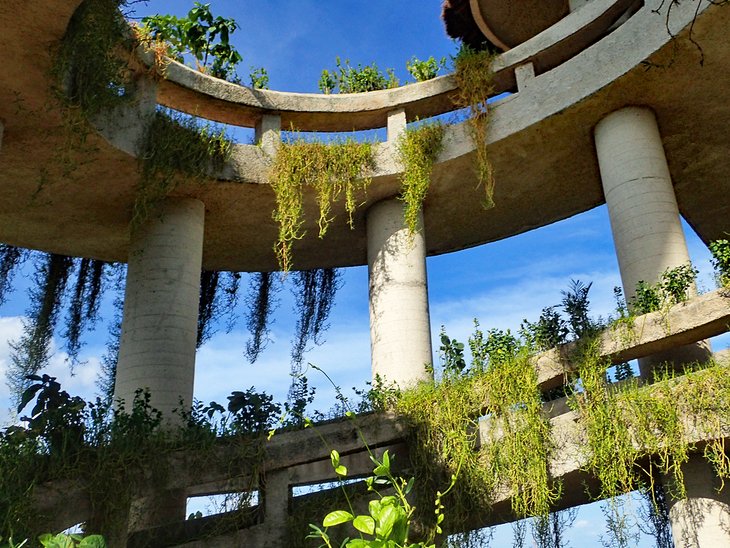
Located just a short drive from Playa del Carmen, Xplor Park offers numerous reasons for vacationers to drag themselves away from their resort for at least a half-day (though you could easily spend a day here).
Numerous fun activities and adventures are included with admission, many of them suitable for kids. Highlights include treetop trekking and ziplining, navigating through caverns and underground rivers on rafts, as well as fun amphibious vehicles (think mini-jeeps) that you can steer through the jungle-like setting along some five kilometers of trails.
Other fun things to do here include swimming in a cavern full of stalactites and stalagmites, or simply lounging about and relaxing on the hammocks provided. The park also offers a variety of food and beverage options, too.
This Xplor Adventure Park tour includes a hotel pickup and drop-off from hotels in Cancun. The six-hour tour includes the entrance fee, lunch, and transportation.
You can also drive yourself to Xplor from Cancun. The trip is about an hour. There is no bus option to get to Xplor from Cancun.
Marvel at Bacalar Lagoon's Seven Shades of Blue
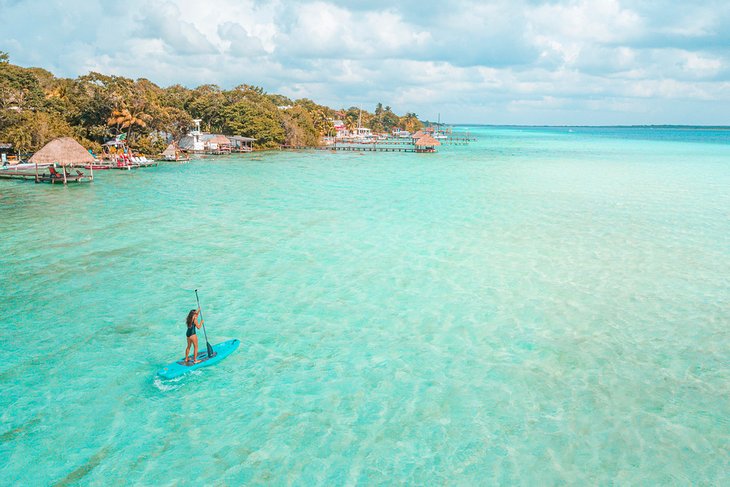
While most travelers to Quintana Roo stop at Tulum, those who keep driving south for a few more hours are rewarded with one of the best-kept secrets in all of Mexico: Bacalar Lagoon.
The second largest lake in Mexico is about four hours from Cancun, but certainly worth the trip and perhaps even an overnight stay. Those who make the journey are rewarded with an unbelievable color palette of different shades of blue. In fact, the nickname of Bacalar is "The Lake of Seven Colors."
The spectacular freshwater lake is a veritable playground for adventurous travelers. From kayaking to stand up paddleboarding, sailing, or swimming, activity is always humming on the mirror-like surface of the water.
Plenty of small eco-resorts dot the perimeter of the lake, which make for relaxing, laid-back stays, usually with docks on-site that lead directly out to the lake.
Bacalar may be a far drive from Cancun, but you can find a select number of day trip options from Cancun. This usually includes the lagoon, cenotes, and lunch, and takes about 13 to 16 hours.
If you want to spend a little more time in Bacalar, and I suggest that you do, it's very easy to take the ADO bus from Cancun to Bacalar. The trip is about five hours and 40 minutes by bus. The other option is to rent a car and drive the four-hour trip.


